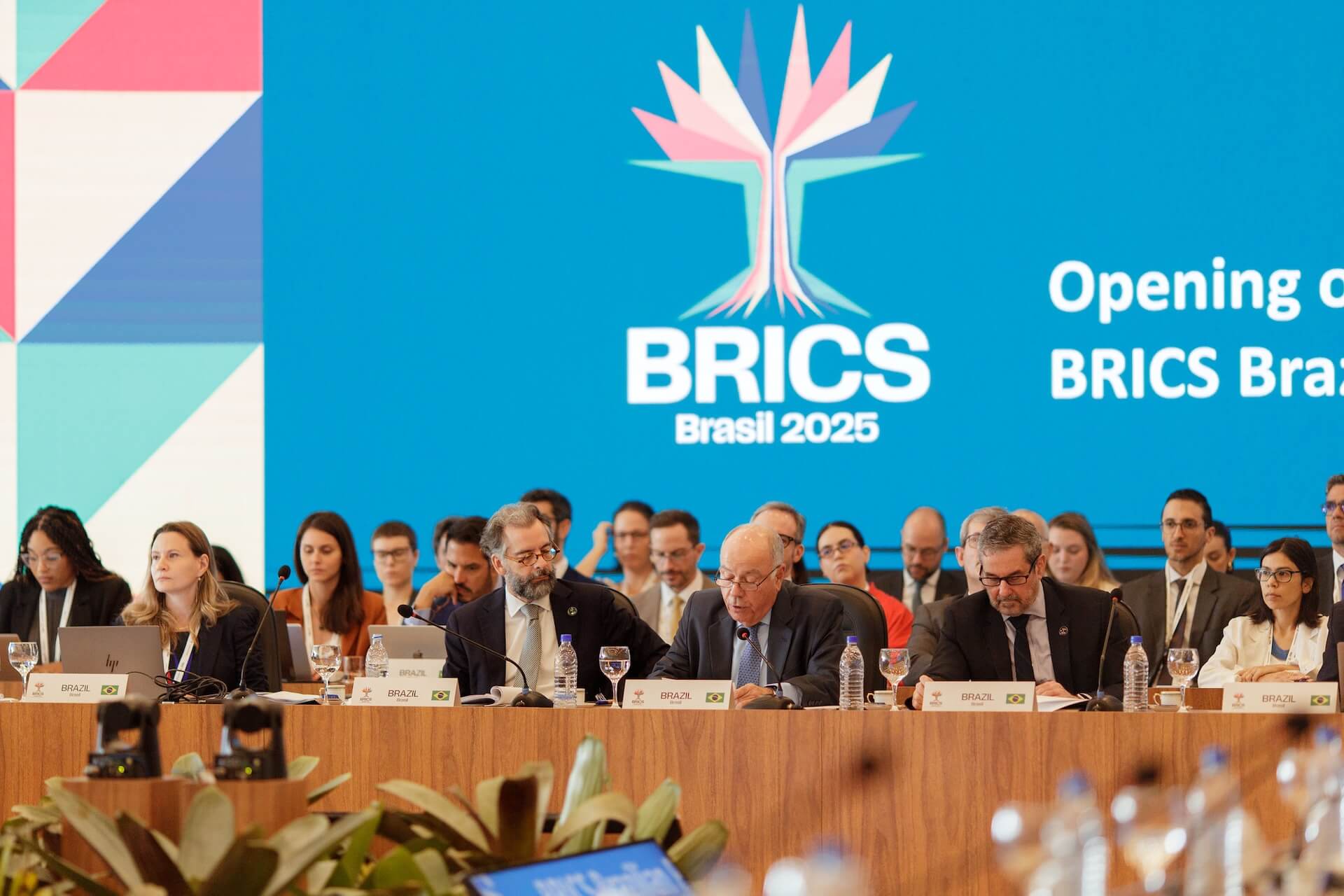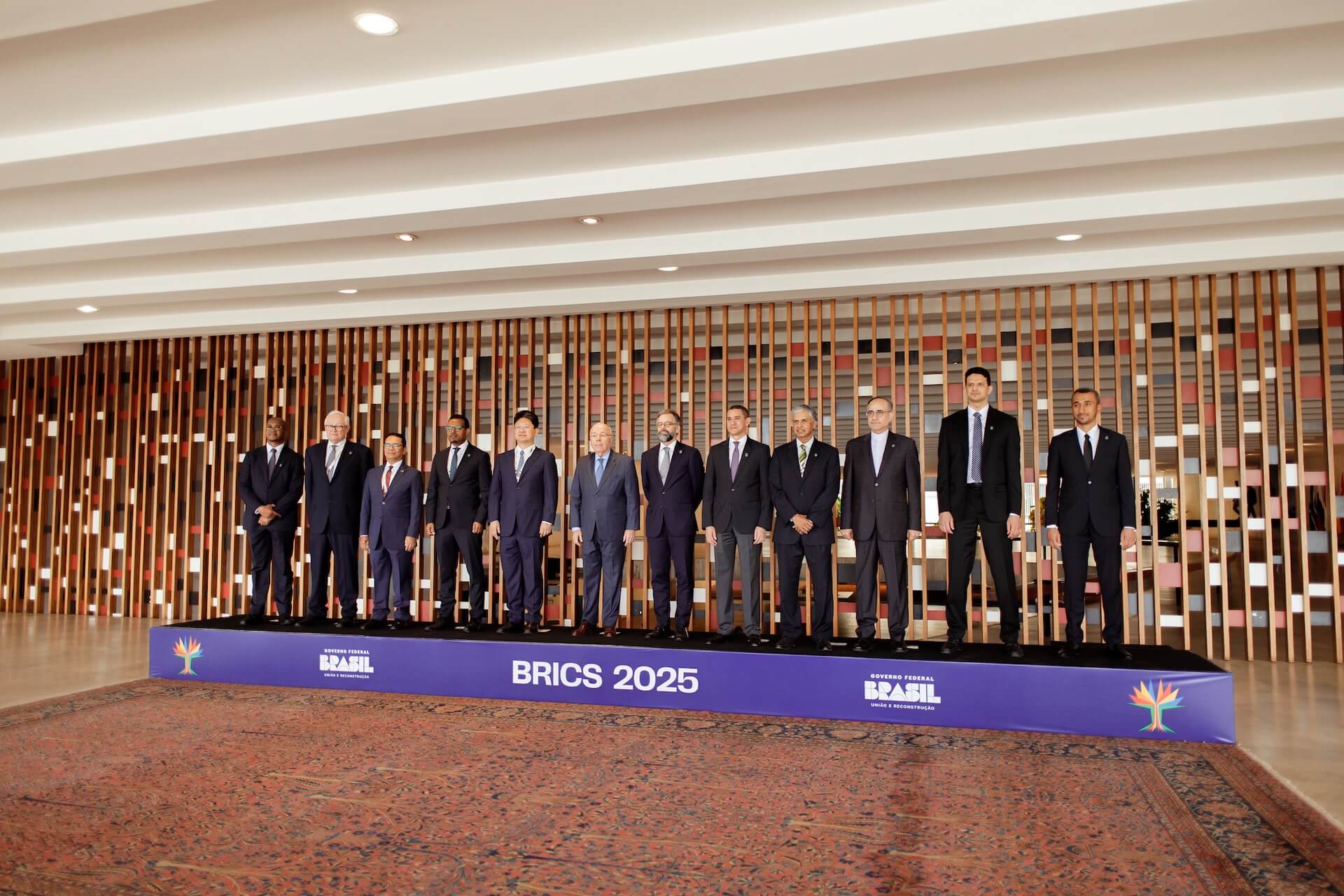Brasil proposes global reforms and defends an active voice for developing countries
Representatives from the 11 BRICS countries are in Brasilia for the first Sherpa meeting under the Brazilian Presidency. Agenda includes strengthening multilateralism, promoting cooperation among Global South Nations, and reforming international governance. Minister Mauro Vieira and Sherpa Mauricio Lyrio highlighted Brasil’s priorities, including health, trade, climate, and artificial intelligence.

By Leandro Molina | leandro.molina@presidencia.gov.br
On February 24 and 25, Brasilia is hosting the first BRICS Sherpas meeting under the Brazilian Presidency, with the presence of representatives from the 11 countries that compose the group. Taking place at the Itamaraty Palace, the event marks the beginning of an ambitious agenda focused on strengthening multilateralism, promoting cooperation among Global South countries, and reforming international governance to reflect the needs and aspirations of developing nations.
Ambassador Mauricio Lyrio, Brasil’s Sherpa at the BRICS, conducted the meeting’s opening session, during which he highlighted that Brasil is honored to assume the group’s rotating presidency. He emphasized the importance of the BRICS in a challenging global context with interconnected crises and the need for multilateral cooperation.
Next, Brasil’s Minister of Foreign Affairs, Mauro Vieira, made an emphatic speech in which he underscored the relevance of the BRICS in a moment of deep global transformations. Under Brasil’s leadership, efforts are turned to consolidate cooperation among the group members and advance reforms to strengthen the role of developing countries in the international landscape.
"It is a great honor to welcome you to this inaugural meeting of the Brazilian BRICS Presidency. We are gathered in a crucial moment — of profound transformations, in which the principles of multilateralism and cooperation are being tested by crises that demand urgent and collective action," Vieira stated.
The minister stressed that the international order is undergoing significant changes, with geopolitical tensions, growing inequalities, and rapid technological and economic transformations that challenge traditional governance structures. "Long-standing institutions are facing difficulties to adapt, while the emerging economies rightfully claim for a more equitable role in the definition of decisions that affect us all," he said.
Minister Mauro Vieira highlighted the fundamental role of the BRICS in promoting a more just, inclusive, and sustainable world order. "A multipolar world is not only an emerging reality — it is a shared objective. A global system with new balance must be more deeply founded on equity and representativeness, and this kind of foundation cannot be built without the voices of the BRICS,” he declared.
BRICS expansion and Global South representativeness

The minister celebrated the group’s recent expansion, from five to eleven countries. "We represent almost half of the world’s population and 39% of global GDP, and we are also responsible for half of the global energy production. This expanded BRICS symbolizes a Global South that is not only a participant in global issues but an influential and constructive force in the configuration of the international order”, he pointed out.
Vieira emphasized the need to redefine global governance to reflect the realities of the 21st century. "Global institutions must evolve to accommodate various perspectives, making sure that the developing nations are not mere spectators but active architects of the future. The BRICS represents a new vision of global governance —one that prioritizes inclusion, equity, and cooperation over hegemony, injustice, inequality, and unilateralism.”
Global challenges and the response of the BRICS
The Brazilian Minister of Foreign Affairs addressed the current challenges, such as humanitarian crises, armed conflicts, and political instability, while also highlighting the need for an encompassing reform of the global security architecture. "The BRICS must defend a multilateral approach to conflict resolution, with emphasis on democracy, mediation, crisis prevention, and sustainable development," he stated.
In the economic sphere, Vieira criticized the "de-globalization" process and called for an open and fair multilateral trade system. "The BRICS must resist this fragmentation and advocate for an open, fair, and balanced multilateral trade system — one that tends to the needs of the Global South and promotes a truly multipolar economic order," he defended.
He also underscored the importance of reforming the global financial architecture, citing the New Development Bank as a vital mechanism for financing infrastructure and sustainable development projects in emerging economies.
Brazilian Presidency priorities
Brasil’s BRICS Presidency will focus on six prioritarian areas: cooperation in global health global; trade, investments and finance; combating climate change; artificial intelligence governance; reforming multilateral peace and security systems; and the institutional development of the BRICS.
Mauro Vieira highlighted the need for a more coordinated and inclusive global health architecture, particularly after the inequalities exposed by the COVID-19 pandemic. "Economic status cannot determine access to health. We cannot accept an international hierarchy of diseases and treatments," he observed.
On the issue of artificial intelligence, the minister underscored the importance of an inclusive and democratic global governance. "AI global governance must be inclusive and democratic, while also contributing to economic development. It must not be dictated by a small group of stakeholders while the rest of the world is forced to adapt to rules it did not help to establish," he argued.
The climate crisis was another central issue in Vieira’s statement. "Climate justice must be at the center of international discussions to ensure that developing nations have both the autonomy and the resources required to make the transition towards low-carbon economies without giving up on their development goals," he stressed.
A call to collective action
Brasil’s Minister of Foreign Affairs, Mauro Vieira, closed his speech with a call to collective action. "The world is at a crossroad and the choices we make today will shape the future of global governance for the next generations. The BRICS was founded based on the principles of cooperation, equity, and mutual respect. When we begin this journey together, we reaffirm our commitment to building a more just, inclusive, and sustainable international order," he concluded.